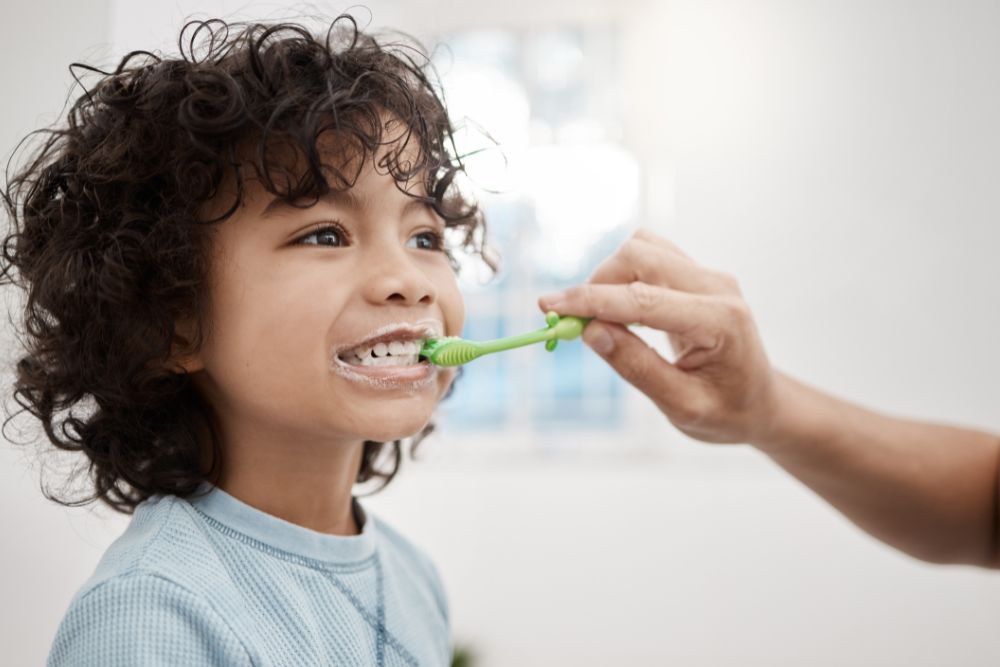Taking care of your child’s teeth throughout their life means having a structured approach that changes as they grow. From the first tooth eruption to navigating braces and wisdom teeth, each stage requires special attention.
At Oxford Dental, we understand the importance of pediatric dental care in Edmonton, where kids’ smiles deserve the best!
Let’s take a look at the journey of kids’ dental care through the years, ensuring they grow up with healthy teeth.
Infancy (0-6 months): First Dental Visit
During your child’s first six months of life, you should schedule their first kids’ dentist visit – even before any teeth have appeared. While teeth may not have surfaced yet, this early visit allows the pediatric dentist to keep track of their oral development.
They can also provide you with guidance on teething, cleaning practices, and the importance of a healthy diet for dental well-being.
You can also address any concerns or questions you have about your child’s teeth, setting a positive foundation for ongoing dental care.
These early visits are usually quick and focus on creating a relationship with the dentist and talking about essential oral hygiene practices.
- Inaugural visit to the pediatric dentist.
- Guidance on cleaning techniques for gums.
- Information on feeding practices.
- Expectations for teething.
You can learn more about your child’s first dental visit here.
Teething (6-24 months): First Teeth Eruption
As your child’s first teeth emerge, usually between 6 to 24 months, you’ll begin to encounter the challenges of teething. A pediatric dentist can offer valuable advice on teething remedies.
They can also help you with appropriate oral hygiene practices and how to introduce a soft toothbrush to your child. Creating early habits during this phase of your child’s life sets the foundation for a lifetime of good oral health.
Plus, your child’s dentist can help identify normal teething discomfort versus potential issues that may require professional attention.
At this age, dental visits usually include a gentle examination of emerging teeth but are mostly focused on guidance for tooth pain management and recommendations for soothing techniques.
- Emergence of the first teeth.
- Signs and management of teething discomfort.
- Introduction of a soft-bristled toothbrush.
- Use of fluoride-free toothpaste.
Toddlerhood (2-3 years): Toothpaste Introduction & Supervised Brushing
Around the age of two, toddlers can start using a small amount of fluoride toothpaste. Supervised brushing sessions are important so that you can ensure a proper technique and help your child avoid swallowing toothpaste.
Creating a positive association with dental care at this stage helps to develop a routine that will last into their later years. At this age, pediatric dentists can guide you on age-appropriate dental tools and techniques.
Visiting the dentist during toddlerhood will begin to involve a more thorough examination of the teeth along with demonstrations on proper brushing techniques.
- Introduction of a pea-sized amount of fluoride toothpaste.
- Supervised brushing by parents or caregivers.
- Emphasis on proper brushing technique.
- Prevention of excessive toothpaste consumption.
Preschool (3-6 years): Regular Dental Visits & Brushing Routine

kids dental care
As your child reaches the age of three, regular dental visits become more frequent, and start to focus more on preventative care.
Your dentist will continue to guide you on proper brushing techniques and the importance of a balanced diet. Although this advice may seem repetitive, it can change as your child grows and changes as well.
During these visits, the dentist will begin x-rays and professional cleanings based on your child’s comfort levels. They will help your child become comfortable with flossing, polishing, and fluoride rinses.
It’s at this age that children are more receptive to developing healthy routines. Regularly visiting a pediatric dentist can help your child build a lifelong commitment to dental health.
- Establishment of regular dental visits.
- Reinforcement of consistent brushing and flossing.
- Addressing emerging oral health issues.
- Introduction to preventative measures.
Early School Years (6-12 years): Cavity Prevention & Orthodontic Evaluation
Once your child begins school, they should have all of their baby teeth, with some falling out to make room for permanent teeth. It is at this age that cavity prevention becomes a primary focus.
Your dentist will continue to educate you and your child about the importance of proper brushing, flossing, and regular dental check-ups.
During this time, an orthodontic evaluation may be recommended to address any emerging concerns. This will help ensure that your child receives timely intervention, like braces, if needed.
Around this age, dental visits become more thorough, with examinations, cleanings, and preventative treatments like dental sealants.
- Emphasis on cavity prevention.
- Recommendation of dental sealants and fluoride treatments.
- Initiation of orthodontic evaluations.
- Assessment of teeth alignment.
Tween and Teen Years (12+ years): Orthodontic Treatment & Wisdom Teeth
The tween and teen years, when your child is 12 and older, often involve orthodontic treatments if they are needed. These treatments address issues such as overcrowding, bite misalignment, and spacing problems. Braces or other orthodontic appliances may be recommended to guide teeth into their proper positions.
Regular dental check-ups continue, and keeping an eye on wisdom teeth becomes important. Your child’s dentist will check their development and positioning and can provide guidance on potential issues such as impaction, crowding, or infection.
Maintaining oral health throughout the teenage years is important for preventing complications and ensuring the success of orthodontic treatments.
- Potential need for orthodontic treatments.
- Consideration of braces or corrective measures.
- Monitoring and addressing the development of wisdom teeth.
- Ensuring optimal dental alignment during adolescence.
Kids Dental Care in Edmonton
Your child’s dental care requires a proactive approach, starting from infancy all the way into their teenage years.
By understanding age-specific needs and instilling positive habits, you can contribute to the development of a strong foundation for your child’s oral health.
For expert guidance and personalized pediatric dental care in Edmonton, trust the experienced professionals at Oxford Dental.
Contact us today to schedule your child’s next dental visit and ensure a lifetime of healthy smiles!

